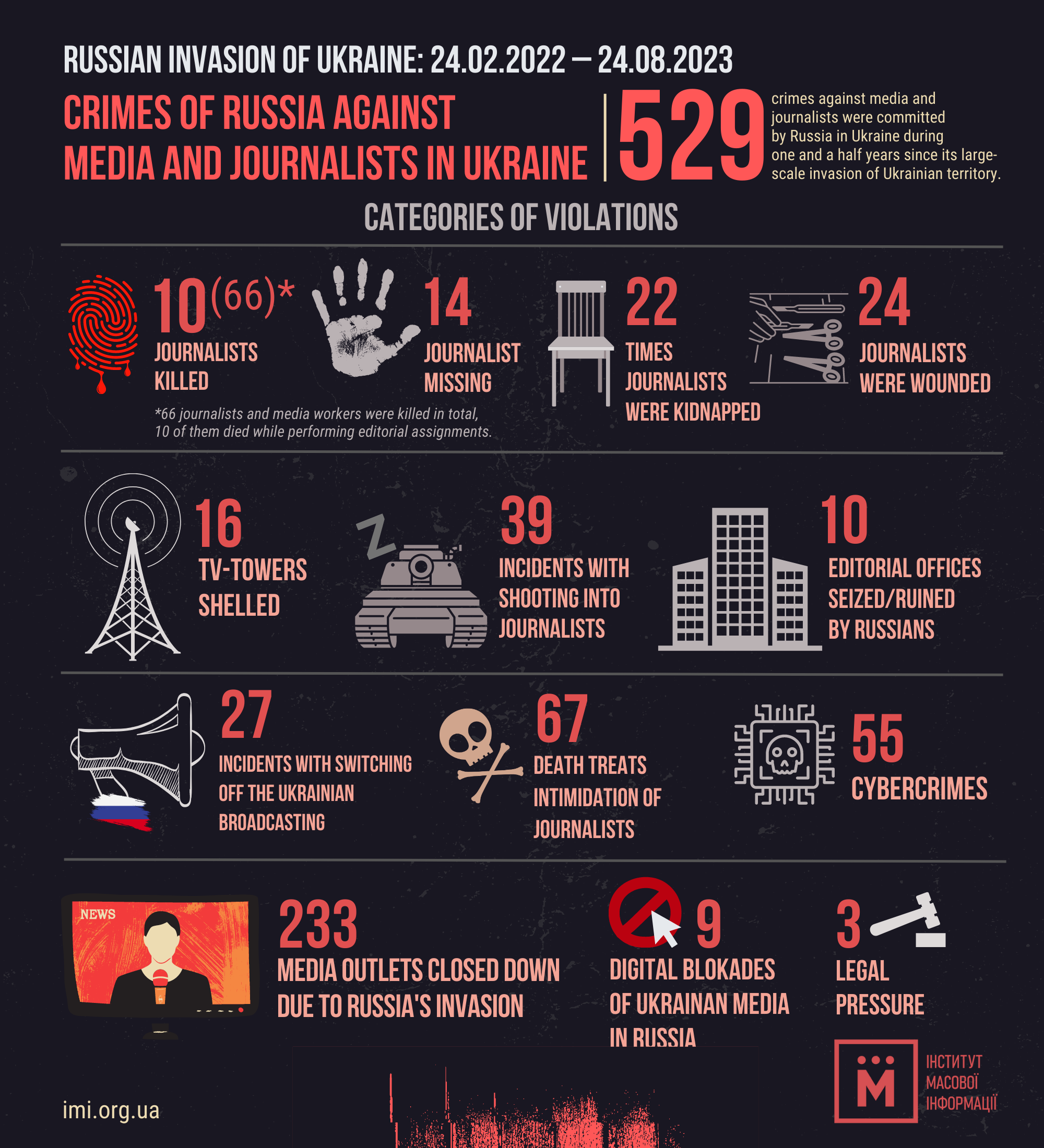In the year and a half since the start of the full-scale invasion, Russia has committed 529 crimes against journalists and media in Ukraine.
This is evidenced by the Monitoring of Russian Crimes against Journalists and Media carried out by the Institute of Mass Information.
In total, since the start of Russia’s full-scale invasion of Ukraine, the occupiers have:
- killed 66 journalists, 10 of whom died while reporting. The Russians murdered 6 foreign and 60 Ukrainian journalists.
- captured or kidnapped media workers 22 times. Namely, UNIAN journalist Dmytro Khyliuk and Iryna Levchenko, a reporter from temporarily occupied Melitopol (Zaporizhzhia oblast), are currently being held captive by the Russians.
- wounded 24 journalists by shelling. Namely, the journalists have gotten concussion and shrapnel wounds, had their bones broken and limbs injured.

In the one and a half years of the big war, the Russians have shelled Ukrainian TV towers 16 times despite those being considered civilian objects. This caused TV and radio broadcasting to disappear in nine oblasts of Ukraine.
The invasion also resulted in at least 233 Ukrainian media outlets closing down in whole or in part. The outlets were forced to close due to direct threats from the Russian occupiers, their offices being seized or destroyed, being unable to work under occupation, and the financial crisis caused by the Russian war.
The Russians continue to attack Ukrainian online media outlets covering the war (IMI has recorded 55 such cases so far). In particular, Russian cybercriminals have hacked media websites, changing the news articles there to Russian manifestos, posting Russian symbols or calls to surrender. Moreover, IMI has recorded phishing attempts targeting Ukrainian media and journalists.
IMI also recorded 67 cases of journalists and editors of both national and regional media receiving threats. At first, the occupiers would threat the journalists personally (by coming to the journalists’ homes or to their parents) and then switched to online threats (e-mails threatening prosecution, imprisonment, torture, interrogations and nuclear strikes).
Overall, during July–August 2023, IMI recorded five freedom of speech violations committed by Russia: wounding journalists, cyber attacks and legal pressure on media workers.
In July, Maksym Shwartzman, a soldier, photojournalist and videographer for the Chernivtsi news agency ACC, was killed in action in Donetsk oblast. He enlisted in the Chernivtsi Territorial Defense in the first days of the full-scale war. According to IMI, Maksym Shwartzman is the 66th media worker to be killed in the course of Russia’s aggression.
A reporter for the French news agency AFP was wounded by a drone strike near Bakhmut, Donetsk oblast, on July 24. All journalists were actively reporting, covering the work of the Ukrainian army.
Furthermore, Russia has declared two Ukrainian journalists – Natalya Moseychuk and Yanina Sokolova – wanted. The propagandists remarked that last year the Investigative Committee of the Russian Federation had opened a case against Moseychuk “for calling for violence against Russian pilots and their relatives.” Previously, speaking on the “United News” marathon, the TV host reacted to reports about another bomb strike on Ukraine. She reminded the Russian military and their families about their responsibility. In particular, Moseychuk said that the wives of the Russian occupiers should “be afraid and understand that sooner or later” they will become widows. And she advised the brides of Russian pilots to “find black headscarves.”
Yanina Sokolova responded to the news about being wanted with irony, noting that “I was already warrying that I’m not Russophobic enough. So I am glad they did it.”
ZN.UA editors reported that their website was subjected to a Russian DDoS attack on the night of August 9. The website was under attack for several hours, which prevented readers from accessing information. However, the outlet managed to repel the attack and restore the website.
Moreover, on the night of August 21, the Russians hacked the Telegram channel of the Ukrainian media outlet “RIA Melitopol”, which continued to work even after Melitopol (Zaporizhia oblast) was occupied. The media posted the relevant statement on its website. The editors noted that “the ruscists are posting their shameful news on the TG channel, changed the channel’s name to Russian and added a different profile picture.”
